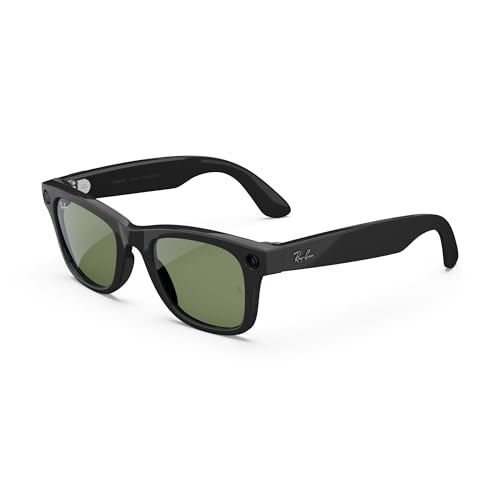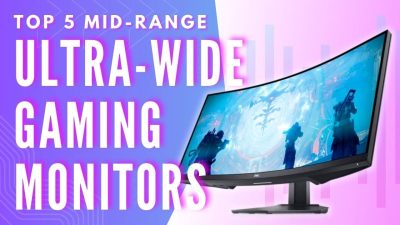📢 Disclosure: Some links on this page are affiliate links. As an Amazon Associate, I earn from qualifying purchases at no extra cost to you. Thanks for your support.
What are smart glasses?
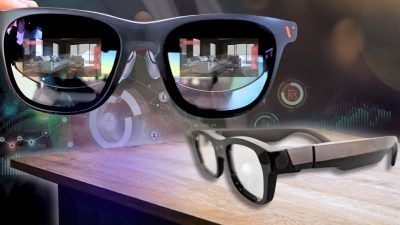
Augmented Reality (AR) and Mixed Reality (MR) smart glasses are evolving rapidly, offering a mix of entertainment, productivity, and immersive experiences. While not as powerful as VR headsets, they provide a lightweight, portable alternative that seamlessly blends digital content with the real world.
Today, we’ll be reviewing some of the best AR and MR smart glasses, covering design, functionality, display quality, and unique features to help you find the right pair.
Ray-Ban Meta smart glasses: The most stylish pair
If style matters as much as functionality, the Ray-Ban Meta Smart Glasses are one of the most fashionable wearable tech options available. Designed in collaboration with Meta, they combine Ray-Ban’s iconic frames with built-in smart features for capturing moments hands-free and staying connected.
What They Offer
- Built-in camera for hands-free photo and video capture.
- Open-ear speakers and microphones for calls, audio, and voice control.
- Social media sharing features through the Meta View app.
- Classic Ray-Ban styling with lightweight, comfortable frames.
What They’re Best For
- Hands-free photos and video clips.
- Quick social-media sharing via the Meta View app.
- Voice-controlled convenience for calls, capture, and basic functions.
- Everyday wear thanks to their traditional eyewear look.
Limitations
- No gaming, AR overlay, or display features.
- Battery life varies with use and drains faster when recording video.
- Not a replacement for VR or AR headsets.
Who They’re For
These glasses are great for social-media creators, travelers, and anyone who wants a stylish pair of smart glasses for capturing content without pulling out a phone. They’re not designed for augmented reality or heavy tech functionality, but they shine best as fashionable, camera-enabled eyewear with convenient audio and voice features.
Rokid Max: The best smart glasses for entertainment & gaming
The Rokid Max is an excellent choice for those looking for a portable display solution. These function primarily as wearable displays for media and gaming, not as glasses with built-in AR overlays.
- 215-inch equivalent Full-HD OLED display
- 120Hz refresh rate for gaming
- 50° field of view & 600 nits brightness
- USB-C connectivity for phones, tablets, and handheld consoles
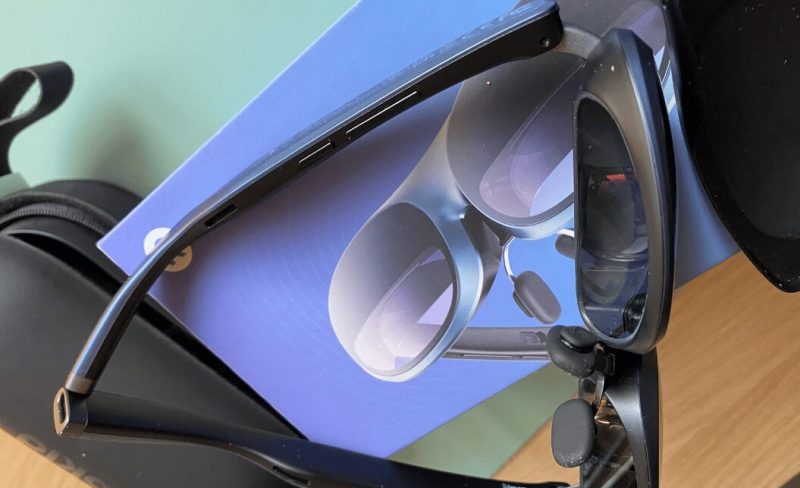
What They’re Best For:
- Watching movies and media
- Gaming on handheld consoles like the Steam Deck or ROG Ally
- Using as a secondary display for work
Limitations:
- Not true AR glasses (no overlayed digital content)
- Requires additional Rokid Station for a standalone experience
- Bulky design, can heat up after prolonged use
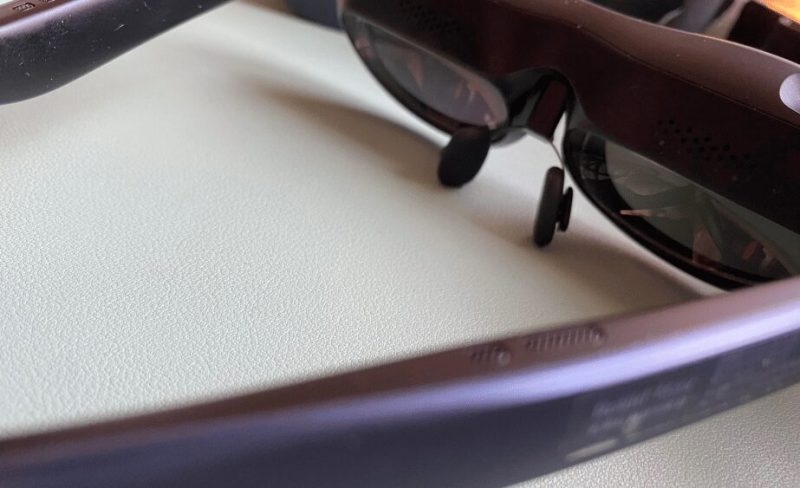
Rokid Max delivers excellent screen quality for a wearable display, making them great for entertainment and gaming. However, they lack the immersive AR capabilities found in more advanced models.
For a more in-depth review of the Rokid Max, head over to our Rokid Max AR glasses review.
Rokid Max 2 AR glasses
The Rokid Max 2 smart glasses, on the other hand, elevate the portable display experience with a focus on comfort, visual clarity, and customization. They also use Micro-OLED display technology that project a large virtual screen, and include independent diopter adjustments for each eye, allowing users to fine-tune focus without prescription inserts. Its lightweight frame and refined ergonomics aim to support longer viewing sessions, making it suitable for media, gaming, or productivity when connected to compatible USB-C devices that support video output.
What makes it stand out:
- Individual Diopter Adjustment: One of the standout upgrades, allowing each lens to be adjusted separately so users can dial in clear focus without requiring additional corrective lenses.
- Improved Comfort: A lighter design with updated ergonomics helps reduce pressure during long sessions, making the Max 2 more comfortable compared to earlier models.
- High-Quality Micro-OLED Display: The display offers strong brightness and clarity, producing a sharp and vibrant virtual image for movies, gaming, and general media use.
Things worth considering:
- Higher Price: As the updated model, the Max 2 typically costs more than the older Rokid Max and other entry-level wearable displays.
- Requires an External Device: The glasses rely on a USB-C device (phone, PC, handheld console) for video and power and do not function as a standalone headset.
Xreal Air 2 Pro: A strong competitor to Rokid Max
The Xreal Air 2 Pro is similar to the Rokid Max, with some key differences:
Dual Micro-OLED displays (1920×1080 per eye)
Electrochromic dimmable lenses for improved visibility in bright light
Lightweight design for extended wear
Xreal Air 2 Pro vs. Rokid Max:
- Rokid Max offers a brighter screen (600 nits vs. Xreal’s lower brightness)
- Xreal Air 2 Pro has electrochromic lenses, while Rokid Max requires an attachable cover
- Xreal has a lower refresh rate (60Hz vs. Rokid’s 120Hz)
Some limitations:
- No AR functionality (just a virtual monitor display)
- Weaker brightness than Rokid Max
If you prefer a lighter design with adjustable dimming lenses, Xreal Air 2 Pro is a solid alternative to the Rokid Max.
RayNeo X2: True AR capabilities
Unlike the previous options, the RayNeo X2 is a true AR headset, offering real-world overlays and wireless smartphone connectivity.
✔ Full-color MicroLED optical waveguide displays
✔ Real-time language translation & navigation
✔ Built-in AI assistant for calls and messages
✔ 16 MP camera for photos and videos
What They’re Best For:
- Augmented reality overlays
- Live navigation, messaging, and productivity tools
- Gesture control and SLAM system for smart interaction
Limitations:
- Not ideal for watching movies or gaming
- Higher price tag compared to entertainment-focused models
If you’re looking for a proper AR experience, the RayNeo X2 is a fantastic choice. However, if media consumption is your priority, models like Rokid Max or Xreal Air 2 Pro are better suited.
Viture Pro XR glasses: An awesome productivity & gaming option
The Viture Pro XR offers a 135-inch equivalent micro-OLED virtual display with a smooth 120 Hz refresh rate, along with an electrochromic film that blocks external light for better clarity and privacy. It also supports the SpaceWalker app, which enables multiple virtual screens and enhanced productivity features. These glasses are great for immersive gaming, and also on-the-go laptop expansion, or anyone who wants high-end visual clarity in a portable setup. But do keep in mind, the price can be a little steep if you add accessories like the Pro Mobile Dock or controller. The relatively narrow field-of-view at around 46° may be a drawback for some users. But here are some of its features:
- 135-inch equivalent Micro-OLED display
- 120Hz refresh rate
- Electrochromic film for better clarity
- SpaceWalker app for more productivity
What They’re Best For:
- Gaming with an immersive virtual screen
- Enhancing laptop capabilities on the go
- High-end display clarity
Things to note:
- It may be expensive, especially with the Pro Mobile Dock & controller
- Limited viewing angle compared to other smart glasses
Please note: Product visuals, specifications, and descriptions can change over time. All information is provided for reference; confirm the latest details on the live product page.
Key Takeaways – Which smart glasses should you choose?
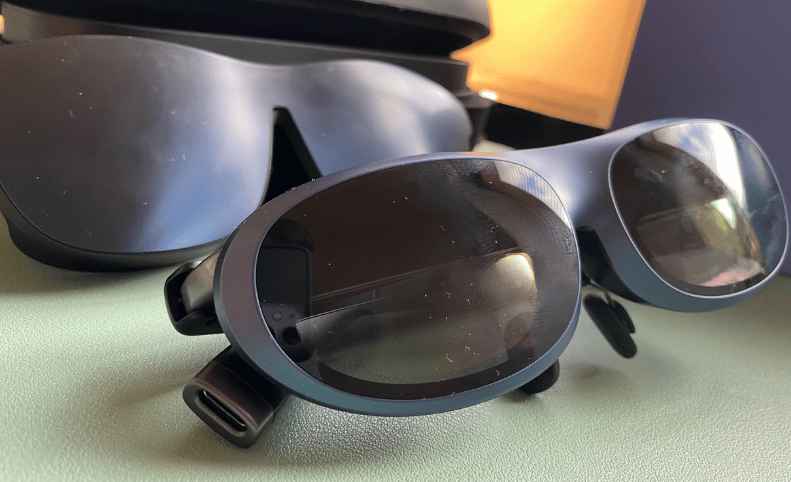
- Rokid Max & Xreal Air 2 Pro are great for screen mirroring but lack AR features.
- RayNeo X2 is the best choice for true AR applications.
- Ray-Ban Meta Glasses focus on hands-free media capture and AI integration.
- Viture Pro XR provides a high-end virtual screen experience but at a premium price.
Keep reading to see what happens when the YouTube streamer, #IShowSpeed, tries AI smart glasses for the first time.
Language translation glasses amaze iShowSpeed on stream
These AI smart glasses left iShowSpeed absolutely stunned when he came across them during his travels in China. The futuristic tech on display had him in awe, and it’s easy to see why. Speed has been lighting up his livestreams lately as he journeys across Asia, racking up views and winning over even more fans across the continent.
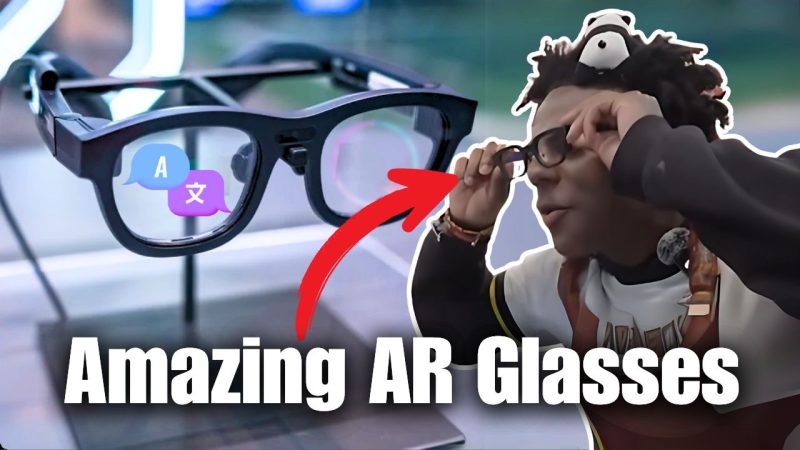
In fact, his visit to China was such a hit that local media dedicated a full 10-minute segment to his livestream reactions, highlighting his genuine amazement at the country’s cutting-edge innovations. One clip in particular went viral, Speed trying on a pair of smart glasses that can translate spoken language in real time. The moment he realized he could instantly understand what his Chinese fans were saying, thanks to live speech translation, his reaction was priceless.
To highlight Chinese tech advancements even more, these AI smart glasses that translate speech have been around for a few years already, quietly evolving into some of the most advanced consumer gadgets in the world. In Western markets, glasses like the Meta Ray-Bans can actually do this, too. Even though they currently only support Spanish, Italian, and French, they’re still super impressive. But Chinese brands like Vivo and TCL offer some awesome options that really widen the field when it comes to translation.
The TCL RayNeo X2 is packed with features
One standout pair is the TCL RayNeo X2, which is equipped with real-time speech translation that supports multiple languages. The built-in microphones pick up what someone is saying and then display translated subtitles right in front of your eyes through the transparent lens. They also include augmented reality navigation, where arrows and directions appear on-screen, making it perfect for exploring new cities. There’s also live camera streaming, letting you capture POV footage directly through the glasses. Plus, they support smart notifications—messages, calls, and reminders pop up on the lens without needing to check your phone. Some models even offer fitness tracking, integrating basic health sensors to monitor your steps and movement throughout the day.
But if I’m honest, if you just want speech translation, there are way cheaper options. While the RayNeo x2 are packed with features, they’re also super expensive, and until the price can come down, I wouldn’t choose this pair.
Alternative cheaper speech translation glasses options
I was amazed to find some really cheap deals being offered on AI smart glasses that are a fraction of the price of the RayNeo x2. Of course, these options don’t feature all the high tech, but for simple activities like listening to audio and speech translation, they are great for the price.
Out of the options, I think this pair by GenXenon looks really smart. Plus, the reviews are much more positive, but as with any tech where the brand is not as well known, it’s best to check them for issues and keep a hold of the warranty in case anything goes wrong.
If you still want speech translation but aren’t into the wearables. This language translator device hits the nail on the head for being travel-friendly, convenient, and easy to use. This device can translate speech in an impressive 138 languages. It weighs just over 8 ounces and makes language barriers a thing of the past. If you’re using ChatGPT you can get a similar experience using just your phone now.
That’s the quickest and cheapest way to get language translation. But this device does simplify the process a lot and it’s designed for that use alone. With only two main buttons on the front for record and translate, it really helps simplify translation.
Watch our video on the best smart translation glasses below:
In other news on smart glasses, check out our overview on the Google XR Smart Glasses.
Thanks for reading, We hope this review of the best smart glasses and language translation devices helped you! By the way, if you’re on the lookout for a new laptop, make sure try our Laptop Finder Quiz. Otherwise, check out our similar tech reviews on the links below.
Combining a BSc in Computing and Business with a passion for digital productivity, Eamon A. has spent the last three years reviewing the latest tech innovations. From high-performance laptops to essential home office accessories, his in-depth comparisons focus on design and functionality, ensuring readers find the perfect tools for their setup.
Last update on 2026-01-27 / Affiliate links / Images from Amazon Product Advertising API
